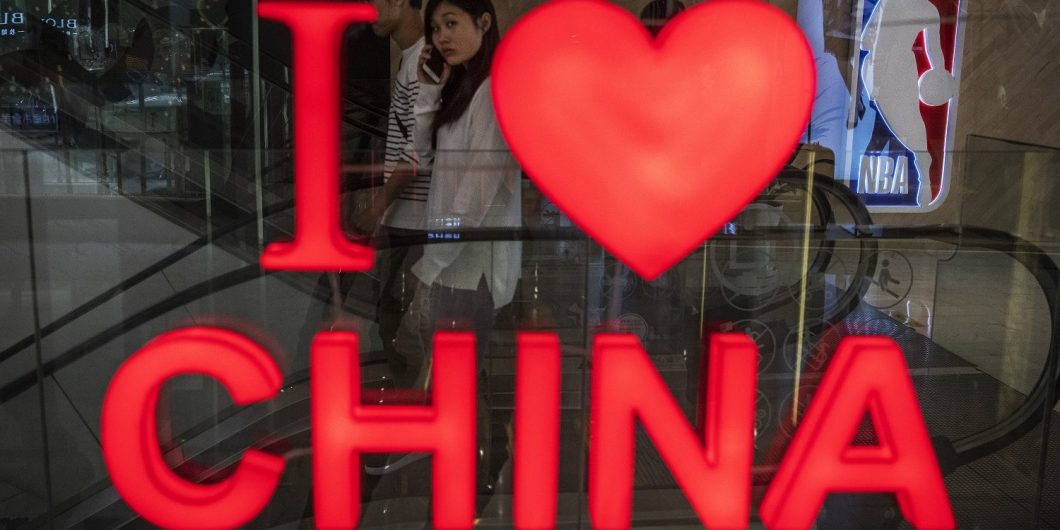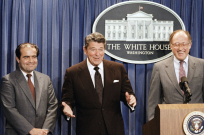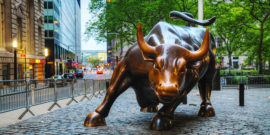One can concede the ills Carlson identifies without conceding that the “free market” caused those ills.
The Blowback Dividends of Woke Capitalism
In shutting down Houston Rockets General Manager Daryl Morey’s Twitter criticism of the Chinese government, excluding fans from preseason games for mildly protesting the NBA’s policy, and imposing mind control on players’s answers to basic questions from a CNN reporter, the NBA has revealed its true loyalties: future China cash flows for its product. The NBA obviously craves the opportunity for new markets to sell its entertainment and its wares. But the depth of its enforcement of measures to appease Chinese authorities has been cringe-inducing. The NBA is clearly willing to suffer short-term PR shame in return for future revenue gains in China that will more than compensate these reputational costs.
That isn’t surprising, but no other recent instance of corporate hypocrisy so thoroughly reveals the cowardly roar of woke capital. Many corporations now tell their employees, or in the case of the NBA, their fans, that they cannot criticize a tyrannical country like China. I’m not disputing private rights here, but such supine conduct in the face of despotism is hard to stomach in this country—and for good reason. This also leads to the real legacy of woke capital: it gives shape to an outrage style in politics, one that ultimately threatens free markets themselves, as insulted citizens increasingly look to government to vindicate their pride. We should, though, publicly indict these companies for the impostors they are and demand they return to their core focus of business and commerce, even if short-term interest might induce them to direct political engagement.
First, let’s hear the cowardly roar. What holds true for the NBA in China, holds true for many more American entertainment conglomerates and corporations, who seek its massive and still growing consumer market. Nike touted its Colin Kaepernick jersey marketing campaign with the tag: “Believe in something, even if it costs you everything.” But news comes from China that Nike has now removed all Houston Rockets products from its stores in that country after the Morey imbroglio. A similar calculation has lead the new Top Gun movie to remove Japanese and Taiwanese patches from the bomber jacket worn by the character playing Maverick to appease the Chinese, and allow it to be shown in their theaters. Marriott fired an employee, at China’s request, for promoting a social media post calling for a liberated Tibet. American Airlines now recognizes Taiwan as part of China. And heroic Apple removed an app from its Hong Kong store that allowed Kongers to identify where police were located. I guess Nike was right, believing in something could really cost you everything.
More disturbing is the record of American technology companies aiding the Chinese regime in surveilling (arresting) their own people by building the digital infrastructure for such work. For example, it is hard to avoid the conclusion that Cisco Systems hasn’t systematically provided and built much of the censorship and surveillance systems the Chinese government uses to control its citizens. From 2003 to 2005, Yahoo turned over emails to the Chinese that led to the imprisonment of four people for engaging in activity that was not criminal activity in any liberal country. Apple removed its VPN app from its Chinese app store at the request of the government, ensuring the Great Firewall reigns supreme over internet usage in that country, preventing citizens from gathering other sources of information. That Apple CEO, Tim Cook, in December of 2017, praised the Chinese government’s internet management practices, is further evidence of how truly hollow our new corporate elites are. But this form of cravenness is nowhere better revealed than in Mark Zuckerberg’s statement to Chinese President (for life) Xi Jinping that he keeps a copy of The Governance of China, a collection of Jinping’s speeches, on his desk for inspiration. Tell me about it: on my desk, underneath my six volume edition of Churchill’s The Second World War, is Xi’s spoken words on how to control over a billion people with cosmic surveillance, concentration camps, organ markets, and religious persecution. The Zuck’s gestures are their own condemnation.
In the light of such behavior, we might recall the recent self-serving statement from the Business Roundtable that its members “share a fundamental commitment to all of our stakeholders.” The promise made was not to its shareholders, as is currently required by law, but to the nebulously and expansively defined “stakeholders”. Corporations, they say, must not merely aim to maximize shareholder profit but must work for labor, the community, the environment, and we might fill in various forms of social, environmental, and racial justice. It is but a skip, jump, and throw away from making companies subservient to government itself. Who knows justice best, its officials might say? We can call the termination of such a process, socialism, as companies would find their operations directed by state edicts.
All has been revealed, though, regarding the nature of woke capital. Its principle is to tout yourself as doing good while doing humane business, but remain relentlessly focused on the bottom line. You succeed by throwing a tub to the whale, pat yourself on the back for donating profits to climate change activism in European capitals, while remaining tied to the most efficient methods of labor organization. There’s nothing wrong with the latter. But it means that Milton Friedman’s shareholder principle that corporations only exist to make money for shareholders never looked more true, despite public statements and acts to the contrary by executives.
Certain companies, however, are learning the meaning of the term “blowback,” which has typically been used to highlight the unintended geopolitical consequences of military interventions. In the corporate context, becoming politically engaged triggers rivalrous “stakeholders” jealous of the power of global companies brought to bear for various causes, in particular, through the marketing and the style of its products and services for those causes. However, corporate campaigns, products, and statements now reward or disregard consumer loyalty in the face of a faux higher calling. But these examples and countless others gloss over how easy it is for global brands to punch down. Here, though, the costs are hidden but no less damaging.
Consider that the unofficial launch to Donald Trump’s 2016 presidential campaign began in March of 2015, with the week-long Democratic Party/corporate/entertainment moguls hyper-reaction to Indiana’s just passed Religious Freedom Restoration Act statute, signed appropriately enough by Governor Mike Pence. For one week in March, the NCAA, the Silicon Valley complex, the Obama administration, every celebrity who cared to, and many more, decried Indiana, its Republican Party, and leading state officials as anti-gay bigots. To label this a mob mentality misses what happened, for while it was full of intensity and irrational behavior, the key actors understood exactly what they were doing. Their reaction had no foundation in the law, as was patiently explained by, among others, University of Virginia Law Professor Douglas Laycock.
No, the vehement opposition to the law owed to its targets, easy to slap social conservatives, which create new business opportunities. As such, a forum was provided to corporate elites to showcase their woke capital bona fides by threatening boycotts, mocking Christians, and declaring their undying empathy with those whose lives would never be the same if such legislation was allowed to stand. Oh, bother. However, Donald Trump in the wake of this event received record level support and votes from evangelical Christians because he promised to protect them from the slick mob that had threatened them, and it was believed would do so for four years under a Democratic president. And so far, he has. Perhaps that is the ultimate consequence of woke capital, they created a new political market, woke post-liberal conservatism.
Outrage at the failure of major corporations to stand for core political freedoms in the face of Chinese despotism promises to return even more of these blowback dividends. I’ll bet President Trump is looking forward to signing those dividend checks.


